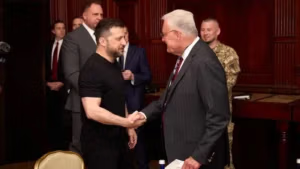As international outrage grows over emaciated Israeli hostages shown in militant-released videos, Israeli Prime Minister Benjamin Netanyahu has publicly accused Hamas of sabotaging ceasefire negotiations. At the same time, he’s turned to the International Red Cross to deliver food and medical care to captives held in Gaza, a notable shift in Israel’s public messaging as protests and political pressure mount at home.
What Sparked the Latest Tensions?
Over the weekend, tens of thousands of demonstrators filled Tel Aviv’s streets, calling on Netanyahu to reach a deal to secure the release of hostages still held in Gaza. Many held placards with messages like “Stop the war” and “Leave no one behind.” Their anger was fueled by disturbing videos released last week by Hamas and Palestinian Islamic Jihad, showing captives Evyatar David and Rom Braslavski in a frail and gaunt condition.
The videos prompted swift global condemnation. The International Committee of the Red Cross (ICRC) said it was “appalled” and demanded that “the dire situation must come to an end.” French President Emmanuel Macron called the footage “unbearable,” and German Chancellor Friedrich Merz said it shows “that Hamas should have no role in Gaza’s future.”
Netanyahu’s Response and the Red Cross Request
In response to the uproar, Netanyahu’s office said on Sunday that the prime minister spoke with Julien Lerisson, the Red Cross’ top official in the region, requesting his assistance in providing immediate medical care and food to hostages. It’s a rare move: Hamas has long denied the ICRC access to those held captive.
Still, the Israeli government doubled down on its denial of famine conditions inside Gaza — a statement that contrasts with warnings from international organizations. The UN-backed food security agency said this week that “the worst-case scenario of famine” is unfolding in the enclave.
What Hamas Is Saying
Hamas claims it’s willing to allow food and medicine deliveries to the hostages — but only if humanitarian corridors are opened throughout Gaza. The group also argues that the condition of the hostages is a reflection of Gaza’s own humanitarian collapse. Abu Obeida, spokesperson for Hamas’ al-Qassam Brigades, said:
“They will not receive any special privileges amid the crime of starvation and siege.”
Another Hamas official, Izzat Al-Rashiq, added that the images are “the definitive response to all who deny the existence of famine in Gaza.”
While previously freed hostages have also appeared malnourished and described deprivation, Hamas insists the treatment is consistent across captives, fighters, and civilians.
The Hunger Crisis on the Ground
The World Health Organization last week warned that malnutrition-related deaths in Gaza are spiking. In just the first two weeks of July, more than 5,000 children under five were treated for malnutrition. Food insecurity is growing rapidly, with nearly 40% of Gaza’s population going days without eating.
Even efforts to obtain aid are dangerous. A Sunday shooting near an aid distribution site in northern Gaza left at least 13 dead and dozens more injured, according to Gaza’s Emergency and Medical Services.
Ceasefire Talks Stalled — Again
Access for the Red Cross would mark a departure from Hamas’ usual posture, which has previously denied such requests. The ICRC has publicly expressed its frustration, saying in March it was “hugely disappointing” not to have been granted any visits with hostages despite repeated attempts.
Peace negotiations remain frozen. U.S. Special Envoy Steve Witkoff last month blamed Hamas for a “lack of desire to reach a ceasefire,” adding that Washington may consider “alternative options.” Netanyahu echoed this sentiment on Sunday:
“When I see this, I understand exactly what Hamas wants. They don’t want a deal. They want to break us with these horrifying videos, with the false horror propaganda they’re spreading around the world.”
Growing Domestic Pressure in Israel
Despite Netanyahu’s tough stance, internal dissent is building. According to a March poll by the Israel Democracy Institute, more than 70% of Israelis supported a deal that would include ending the war in exchange for the release of remaining hostages. Around 50 hostages are believed to still be in Gaza, with at least 20 thought to be alive.
Families of the captives have publicly pushed back on the government’s military-first approach. In a blistering statement Sunday, the Hostages and Missing Families Forum accused Netanyahu of misleading the public:
“Netanyahu is preparing the greatest deception of all. The repeated claims of freeing hostages through military victory are a lie and a public fraud.”
The group also criticized Hamas, saying it “cannot hide the fact that we are dealing with an evil terrorist organization that has been holding innocent people in impossible conditions for over 660 days.”
Hamas’ Position on Future Talks
While publicly maintaining it’s open to negotiations, Hamas has halted participation in recent weeks, sources familiar with the talks told CNN. The group is now demanding written assurances and humanitarian relief before re-engaging in any ceasefire or hostage-release discussions.
“It is essential to improve the catastrophic humanitarian situation significantly and to obtain a written response from the enemy regarding our response,” said senior Hamas official Basem Naim.
“This is a condition to go back to negotiations.”
As the humanitarian crisis worsens and diplomatic channels stall, Netanyahu is signaling a shift toward military escalation to free hostages — a move hostage families fear may endanger their loved ones. With public opinion shifting and international scrutiny intensifying, the next steps could redefine Israel’s strategy in Gaza — and its relationships at home and abroad.






